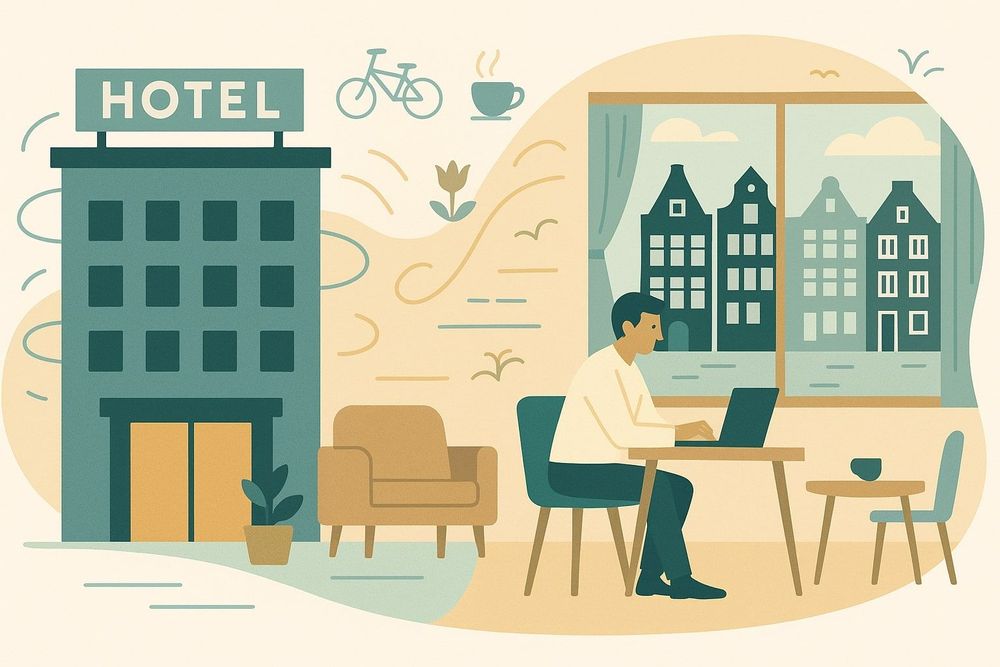Why Amsterdam Short Stay Rentals Beat Hotel Living for Extended Business Trips
Matthew Whittaker • Mon, Jul 14, 2025

Introducing Short Term Rentals in Amsterdam
When your star employee is sent to lead an expansion in Amsterdam, the biggest challenge often is not office space, it’s finding them a place to live that will not drive them stir-crazy by week three. While hotels might seem like the obvious choice for corporate relocations, savvy companies increasingly realise that serviced apartments in Amsterdam offer something hotels simply cannot: a sustainable living experience that keeps executives productive for months instead of just days.
The Hotel Fatigue Factor
Hotels are built for travellers, not long-term workers. After two weeks of eating breakfast next to tourists planning trips to the Rijksmuseum, your executive will already be ready to leave. Living in a temporary space takes a toll, with constant housekeeping interruptions during video calls, nowhere to properly hang clothes, and the subtle stress of feeling like a perpetual guest.
Studies show business travellers’ average trip length has increased by 15% compared to 2019, yet hotel design remains focused on short-term tourism. On average, a serviced apartment offers about 30% more space than a standard hotel room, which makes a significant difference for mental wellbeing and sustained performance.
Monthly rentals in Amsterdam are designed for people who need to work at an executive level for extended periods. They offer dedicated workspaces, fast internet that can handle video conferences, and the comfort of having your own front door.
The Economics of Efficiency for Corporate Stays in Amsterdam
At first glance, the math seems simple: €200 per night for a business hotel versus €4,500 per month for a serviced apartment. However, that comparison does not tell the whole story. Hotel rates fluctuate significantly depending on the date and location, and they charge for each individual night without offering discounts for longer stays. In contrast, many short-stay rentals provide substantial savings for extended bookings. For example, at City Retreat, any stay longer than four months includes a 10% discount on the entire duration of your stay!
More importantly, think about productivity. Hotel living often limits performance to around 70% of normal capacity. The ongoing low-level stress of temporary accommodation and the inability to establish routines can drag down decision-making and creativity. Psychological research shows that anxiety, burnout, poor sleep, and difficulty making decisions are all made worse by unsuitable living conditions.
Serviced apartments in Amsterdam help executives maintain, and sometimes even improve, their productivity. Residents enjoy the experience of living in a new city without the frustrations of tourist-focused lodging. It is no surprise that the global serviced apartment market, valued at $112.42 billion in 2023, is growing at 12.7% each year. Companies are recognizing the productivity advantages these accommodations provide.
The Infrastructure Advantage
Amsterdam’s serviced apartment providers have spent years tailoring their offerings to business travellers. They choose neighbourhoods where executives can walk to meetings instead of staying in areas primarily catering to tourists. Properties are selected for reliable internet, proper heating, and close proximity to business hubs.
About 30% of UK business travellers now choose furnished apartments instead of hotels for long-term assignments. As business trips become longer and often involve entire project teams, there is growing demand for places that serve as both comfortable living spaces and productive work environments.
Hotels, even luxury ones, are still designed mainly for short stays. Their Wi-Fi might handle email but struggle with large file transfers. Desks are often only big enough for a laptop. Lighting is set for atmosphere rather than practical work. In contrast, Amsterdam’s short stay rentals are equipped like high-end home offices because that is exactly what many executives need.

The Social Psychology of Temporary Living
Long hotel stays bring a unique kind of isolation. You are surrounded by people, but they’re all strangers on their own journeys. This might be fine for a few days, but over weeks it can become draining. Expat rentals in Amsterdam give executives the chance to integrate into neighbourhood life, chat with neighbours, visit local cafés, and become part of the city’s everyday rhythm.
This social connection isn’t just a bonus. It’s important for executives making decisions about local markets. Truly understanding Amsterdam’s business culture requires living within it, not observing it from a hotel lobby. Industry data shows that nearly 40% of Gen Y and Gen Z workers specifically prefer apartments over hotels for extended assignments, precisely because of the cultural immersion and authentic local connections they bring.
The Operational Reality
Hotels operate on daily routines. Housekeeping arrives when it suits the hotel’s schedule, not necessarily when your executive has an important call with New York. Short stay rental providers in Amsterdam work around business schedules. Need cleaning done before a client dinner? It’s arranged to fit your calendar.
Business travel research shows that project schedules often change, sometimes with financial consequences. The unpredictable nature of long-term business assignments requires accommodation partners who understand that flexibility isn’t a luxury but a necessity.
This flexibility covers everything from simple requests to urgent maintenance requests. Hotels work according to strict protocols while serviced apartments operate through relationships. When your executive needs something handled quickly, serviced apartment providers treat it as a business priority, not simply a guest complaint.
The Exit Strategy for Short Term Stays
One of the biggest advantages of Amsterdam’s short term rentals is flexibility. If an assignment extends from three months to six, there’s no need to move. If it’s cut short, most providers offer reasonable cancellation terms. If an executive’s family decides to join them, upgrading to a larger apartment, often in the same building, is usually possible.
Hotels, by contrast, lock you into daily rates and provide little flexibility when business timelines change. Serviced apartment providers understand that plans evolve, and they price their flexibility accordingly.

The Real Cost Comparison
Finance teams sometimes focus only on nightly or monthly rates and miss the bigger picture: productivity. An executive staying in a hotel for three months might only reach 85% of their potential productivity because of the challenges of living in a temporary space. The same executive in a well-chosen Amsterdam short-stay rental might work at 110%, thanks to better focus and local integration.
Research shows that 43% of business trips now include some leisure time, highlighting how modern business travel is changing. Accommodation choices increasingly determine whether these extended stays enhance business results or create unnecessary stress.
In hotels, guests often find extra fees, and there are limitations on having visitors or enjoying home-like activities. In contrast, a serviced apartment offers the freedom to invite friends over, host dinners, and truly become part of the local community, making business travel feel less like an obligation and more like an enriching life experience.
When measured against true business outcomes, the cost difference between hotels and serviced apartments often disappears. More importantly, employee satisfaction, retention, and willingness to accept future assignments can be significantly affected. Those factors may not show up on expense reports but can have a major impact on a company’s success.
Search Amsterdam Short Stay Rentals
Serviced Accommodation for Expats
Making the Strategic Choice on Short Stay Rentals
For assignments longer than two months, Amsterdam short-stay rentals aren’t just a more comfortable option, they are a strategic decision. They signal that a company understands the critical difference between business travel and true business living. Serviced apartments provide the stable, personalized environment executives need for complex decision-making and relationship-building.
Most importantly, they show executives that they are valued as essential team members, not just tourists with corporate credit cards. In Amsterdam’s highly competitive business landscape, this thoughtful approach can determine the success or failure of an entire project.
The real choice isn’t simply between hotels and apartments. It’s between treating long business trips like extended vacations or recognizing them for what they truly are: temporary relocations that demand proper living infrastructure. Smart companies are choosing wisely.